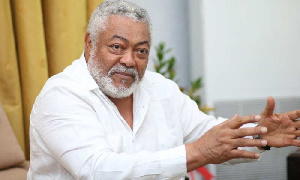The man Rawlings, who died today

The former President of Ghana, who was also the first president of the Fourth Republic when the country turned to multi-party democracy after 11 years of military dictatorship under him, Jerry John Rawlings died today, Thursday November 12, 2020. Medical sources say he died from the complications of the coronavirus disease (COVID-19) at the Korle-bu Teaching Hospital in Accra at the age of 73.
Rawlings who was admitted at the hospital Wednesday, died Thursday afternoon.
The evolution of Ghana politics cannot be talked about without the name of Rawlings, but depending on the individual or group’s experience, not everyone speaks well of his period both as military and civilian leader.
Rawlings who was military leader in 1979 for three months, and December 1981 to December 1992, came to the attention of the Ghanaian public after unsuccessfully attempting a coup d’état against the military regime of General Fred William Kwasi Akufo, the Supreme Military Council (SMC2), who had displaced former military leader, General Ignatius Kutu Acheampong in a palace coup. General Akufo was the Army Commander under General Acheampong.
Rawlings who was then serving in the Ghana Airforce attempted the coup on May 15, 1979, but failed and was arrested and court martialed publicly.
It was during the court martial that he won the hearts of Ghanaians with his charisma and bravado.
While being held in detention awaiting trial, some members of the Ghana Armed Forces led by Major Boakye Gyan staged a coup on June 4, 1979, succeeded, sprang him out of jail and made him the leader. The AFRC ran the country from June 4 to September 24, 1979.
In 1979, during the AFRC regime, former Heads of State were executed by firing squad for abuse of office and corruption.
Rawlings then went on to lead the Armed Forces Revolutionary Council (AFRC), which later went ahead to supervise an election which processes had already been put in motion by the government the AFRC overthrew. The election conducted on June 18, was won by Dr Hilla Limann of the Peoples Nation Party (PNP). Rawlings handed over power to the winner of the elections, Dr Limann, but kept breathing over his neck. He returned to stage another coup on December 31, 1981. He overthrew the popularly elected government of Dr. Limann accusing the regime of corruption.
He hung onto power under the Peoples National Defence Council (PNDC) from 1981 to 1992, when the country was ushered into multi-party democracy under the 1992 Constitution. While some would credit Rawlings with transition to constitutional rule, there are others who would say he was forced to accept constitutional rule. He stood on the ticket of the National Democratic Congress and won the first election in December 1992, but the opposition boycotted the parliamentary election which was held on a different day.
Rawlings served two terms under constitutional rule and handed over to John Kufour in 2000.
The death of Rawlings has shocked the country, because he buried his mother only some three weeks ago.
While Rawlings aggressively preached accountability and denounced corruption, some of his ministers have been accused of corruption.
Former Minister of State, Kojo Yankah who served in the Rawlings government and has written extensively about him said in an interview with TV3 monitored by ghanabusinessnews.com, “he should be remembered for his probity and accountability principles.”
Two journalists who covered Rawlings at the Castle, Osu where he lived and ran the country for nearly two decades, Francis Kokutse and Tei Kitcher had these to say about him.
“President Rawlings was a down to earth man. He made the position of Head of State an ordinary one,” he said.
Recounting an experience with Rawlings during a trip to the Afram Plains in the 80s, he said Rawlings slept in a classroom with the rest of them.
“He was not a man that came to power to amass wealth, at least that was what we saw about him in the 80s.
He did not have patience for those he perceived to be working against the state,” he added.
“He was a remarkable personality. He radiated love and affection. I have lost a big brother, mentor and friend,” said Tei Kitcher, who covered Rawlings from 1985 to 2000.
Kitcher also believes that Rawlings has bequeathed to Ghana a spirit of accountability.
“He imbued in the country the attitude to ask questions about how we are governed. He showed us what selflessness is,” he said.
While some Ghanaians will remember Rawlings as a great leader and as a hero, some families whose relations were executed, fled into exile, lost property, Rawlings is not viewed in favourable lenses.
He is survived by a wife and four children.
By Emmanuel K. Dogbevi & Fred Duhoe
Copyright ©2020 by Creative Imaginations Publicity
All rights reserved. This article or any portion thereof may not be reproduced or used in any manner whatsoever without the express written permission of the publisher except for the use of brief quotations in reviews.
